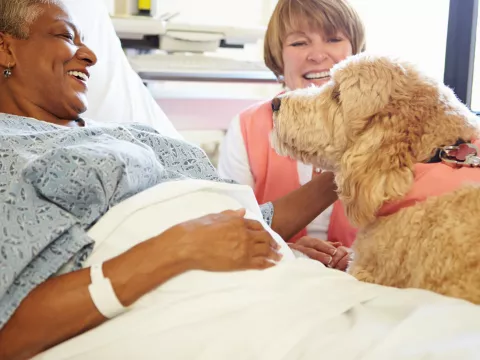- AdventHealth
Creatures Of Compassion
Volunteer Services Pet Therapy Program features canines that play an instrumental role in the care offered at AdventHealth. The dogs serve as cheerleaders, entertainers and even physical therapy assistants, bringing patients smiles and a much-needed distraction.
Volunteer Services Pet Therapy Program dispatches canine patrols to deliver unconditional love to the sick and injured.
Adorable, fun-loving dogs visit patients, instantly etching smiles on the faces of the ill and injured, young and old.
It's plain for anyone to see that canine therapy offers many benefits, but its greatest value isn't as visible. Indeed, its healing powers can even soothe the soul.
"You have to remember that we have a lot of patients who don't get any visitors – certainly not what I call the compassionate kind with family or friends," says Meagan Krizek-Fonseca, a certified child life specialist who oversees the Volunteer Services Pet Therapy Program. "When the dogs go room-to-room, they help patients take their minds off whatever they're going through. And no matter how serious the diagnosis, they're reminded that there is always love to be given."
Introduced at AdventHealth rehabilitation units in 1995 (cq?), pet therapy has become a staple of care throughout the organization. Operating under strict policies and infection control guidelines, as well as the approval of the Society for the Prevention of Cruelty to Animals (SPCA), canine teams make more than 9,000 visits to patients each year.
Sixty dogs and their handlers participate in the Volunteer Services Pet Therapy Program, logging more than 9,000 patient visits annually.
Today, 60 dogs and their volunteer handlers participate in the program. Both go through screening and training before being approved for patient duty, and the canines must demonstrate the proper temperament to fulfill the many tasks asked of them. After all, the dogs aren't there just to look adorable. They serve as cheerleaders, entertainers and even physical therapy assistants.
Fortunately, multitasking comes naturally to Elena Pathak and her nine-year-old golden retriever, Tinker Bell, who volunteer at the outpatient pediatric rehab facility.
For an infant just a few months old, Tinker Bell will sit patiently by the edge of a bed – enticing the mesmerized baby to do "pushups" to get a better glimpse of her. Children struggling to learn how to walk again suddenly relish the task when Tinker Bell joins them step for step. And others, trying to find their voice, jabber excitedly when they're with Tinker Bell. They'll point to the dog's features and repeat words such as eyes, nose, fur and tail.
"They have no idea they're doing speech therapy; they're just talking to Tinker Bell," Pathak says.
Ultimately, that may be the most valuable service Tinker Bell and the other canines provide. They help patients forget the rigors and monotony of therapy regimens, which many of them have been doing for months, if not longer. Such a routine often leaves patients, especially little ones, bored, frustrated and upset.
"They have to calm down so that they can hear you, and Tinker Bell positively affects them just by walking into the room," Pathak says. "That's why I do this. I know the kids just really need her."
For additional information regarding the AdventHealth Pet Therapy Program, please call Call407-303-6938.




